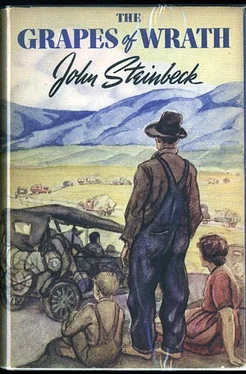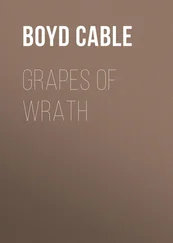John Steinbeck - The Grapes of Wrath
Здесь есть возможность читать онлайн «John Steinbeck - The Grapes of Wrath» весь текст электронной книги совершенно бесплатно (целиком полную версию без сокращений). В некоторых случаях можно слушать аудио, скачать через торрент в формате fb2 и присутствует краткое содержание. Город: New York, Год выпуска: 1939, Издательство: The Viking Press-James Lloyd, Жанр: Классическая проза, на английском языке. Описание произведения, (предисловие) а так же отзывы посетителей доступны на портале библиотеки ЛибКат.
- Название:The Grapes of Wrath
- Автор:
- Издательство:The Viking Press-James Lloyd
- Жанр:
- Год:1939
- Город:New York
- ISBN:нет данных
- Рейтинг книги:5 / 5. Голосов: 1
-
Избранное:Добавить в избранное
- Отзывы:
-
Ваша оценка:
- 100
- 1
- 2
- 3
- 4
- 5
The Grapes of Wrath: краткое содержание, описание и аннотация
Предлагаем к чтению аннотацию, описание, краткое содержание или предисловие (зависит от того, что написал сам автор книги «The Grapes of Wrath»). Если вы не нашли необходимую информацию о книге — напишите в комментариях, мы постараемся отыскать её.
The Grapes of Wrath — читать онлайн бесплатно полную книгу (весь текст) целиком
Ниже представлен текст книги, разбитый по страницам. Система сохранения места последней прочитанной страницы, позволяет с удобством читать онлайн бесплатно книгу «The Grapes of Wrath», без необходимости каждый раз заново искать на чём Вы остановились. Поставьте закладку, и сможете в любой момент перейти на страницу, на которой закончили чтение.
Интервал:
Закладка:
“Pa tol’ me. When’s it gonna be?”
“Oh, not for a long time! Not till nex’ winter.”
Tom laughed. “Gonna get ’im bore in a orange ranch, huh? In one a them white houses with orange trees all aroun’.”
Rose of Sharon felt her stomach with both her hands. “You do not see,” she said, and she smiled her complacent smile and went into the house. The evening was hot, and the thrust of light still flowed up from the western horizon. And without any signal the family gathered by the truck, and the congress, the family government, went into session.
The film of evening light made the red earth lucent, so that its dimensions were deepened, so that a stone, a post, a building had greater depth and more solidity than in the daytime light; and these objects were curiously more individual—a post was more essentially a post, set off from the earth it stood in and the field of corn it stood out against. All plants were individuals, not the mass of crop; and the ragged willow tree was itself, standing free of all other willow trees. The earth contributed a light to the evening. The front of the gray, paintless house, facing the west, was luminous as the moon is. The gray dusty truck, in the yard before the door, stood out magically in this light, in the overdrawn perspective of a stereopticon.
The people too were changed in the evening, quieted. They seemed to be a part of an organization of the unconscious. They obeyed impulses which registered only faintly in their thinking minds. Their eyes were inward and quiet, and their eyes, too, were lucent in the evening, lucent in dusty faces.
The family met at the most important place, near the truck. The house was dead, and the fields were dead; but this truck was the active thing, the living principle. The ancient Hudson, with bent and scarred radiator screen, with grease in dusty globules at the worn edge of every moving part, with hub caps gone and caps of red dust in their places—this was the new hearth, the living center of the family; half passenger car and half truck, high-sided and clumsy.
Pa walked around the truck, looking at it, and then he squatted down in the dust and found a stick to draw with. One foot was flat to the ground, the other rested on the ball and slightly back, so that one knee was higher than the other. Left forearm rested on the lower, left, knee; the right elbow on the right knee, and the right fist cupped for the chin. Pa squatted there, looking at the truck, his chin in his cupped fist. And Uncle John moved toward him and squatted down beside him. Their eyes were brooding. Grampa came out of the house and saw the two squatting together, and he jerked over and sat on the running board of the truck, facing them. That was the nucleus. Tom and Connie and Noah strolled in and squatted, and the line was a half-circle with Grampa in the opening. And then Ma came out of the house, and Granma with her, and Rose of Sharon behind, walking daintily. They took their places behind the squatting men; they stood up and put their hands on their hips. And the children, Ruthie and Winfield, hopped from foot to foot beside the women; the children squidged their toes in the red dust, but they made no sound. Only the preacher was not there. He, out of delicacy, was sitting on the ground behind the house. He was a good preacher and knew his people.
The evening light grew softer, and for a while the family sat and stood silently. Then Pa, speaking to no one, but to the group, made his report. “Got skinned on the stuff we sold. The fella knowed we couldn’t wait. Got eighteen dollars only.”
Ma stirred restively, but she held her peace. Noah, the oldest son, asked, “How much, all added up, we got?” Pa drew figures in the dust and mumbled to himself for a moment.
“Hundred fifty-four,” he said. “But Al here says we gonna need better tires. Says these here won’t last.”
This was Al’s first participation in the conference. Always he had stood behind with the women before. And now he made his report solemnly. “She’s old an’ she’s ornery,” he said gravely. “I gave the whole thing a good goin’-over ’fore we bought her. Didn’ listen to the fella talkin’ what a hell of a bargain she was. Stuck my finger in the differential and they wasn’t no sawdust. Opened the gear box an’ they wasn’t no sawdust. Test’ her clutch an’ rolled her wheels for line. Went under her an’ her frame ain’t splayed none. She never been rolled. Seen they was a cracked cell in her battery an’ made the fella put in a good one. The tires ain’t worth a damn, but they’re a good size. Easy to get. She’ll ride like a bull calf, but she ain’t shootin’ no oil. Reason I says buy her is she was a pop’lar car. Wreckin’ yards is full a Hudson Super-Sixes, an’ you can buy parts cheap. Could a got a bigger, fancier car for the same money, but parts too hard to get, an’ too dear. That’s how I figgered her anyways.” The last was his submission to the family. He stopped speaking and waited for their opinions.
Grampa was still the titular head, but he no longer ruled. His position was honorary and a matter of custom. But he did have the right of first comment, no matter how silly his old mind might be. And the squatting men and the standing women waited for him. “You’re all right, Al,” Grampa said. “I was a squirt jus’ like you, a-fartin’ aroun’ like a dog-wolf. But when they was a job, I done it. You’ve growed up good.” He finished in the tone of a benediction, and Al reddened a little with pleasure.
Pa said, “Sounds right-side-up to me. If it was horses we wouldn’t have to put the blame on Al. But Al’s the on’y automobile fella here.”
Tom said, “I know some. Worked some in McAlester. Al’s right. He done good.” And now Al was rosy with the compliment. Tom went on, “I’d like to say—well, that preacher—he wants to go along.” He was silent. His words lay in the group, and the group was silent. “He’s a nice fella,” Tom added. “We’ve knowed him a long time. Talks a little wild sometimes, but he talks sensible.” And he relinquished the proposal to the family.
The light was going gradually. Ma left the group and went into the house, and the iron clang of the stove came from the house. In a moment she walked back to the brooding council.
Grampa said, “They was two ways a thinkin’. Some folks use’ ta figger that a preacher was poison luck.”
Tom said, “This fella says he ain’t a preacher no more.”
Grampa waved his hand back and forth. “Once a fella’s a preacher, he’s always a preacher. That’s somepin you can’t get shut of. They was some folks figgered it was a good respectable thing to have a preacher along. Ef somebody died, preacher buried ’em. Weddin’ come due, or overdue, an’ there’s your preacher. Baby come, an’ you got a christener right under the roof. Me, I always said they was preachers an’ preachers. Got to pick ’em. I kinda like this fella. He ain’t stiff.”
Pa dug his stick into the dust and rolled it between his fingers so that it bored a little hole. “They’s more to this than is he lucky, or is he a nice fella,” Pa said. “We got to figger close. It’s a sad thing to figger close. Le’s see, now. There’s Grampa an’ Granmathat’s two. An’ me an’ John an’ Ma—that’s five. An’ Noah an’ Tommy an’ Al—that’s eight. Rosasharn an’ Connie is ten, an’ Ruthie an’ Winfiel’ is twelve. We got to take the dogs ’cause what’ll we do else? Can’t shoot a good dog, an’ there ain’t nobody to give ’em to. An’ that’s fourteen.”
“Not countin’ what chickens is left, an’ two pigs,” said Noah.
Pa said, “I aim to get those pigs salted down to eat on the way. We gonna need meat. Carry the salt kegs right with us. But I’m wonderin’ if we can all ride, an’ the preacher too. An’ kin we feed a extra mouth?” Without turning his head he asked, “Kin we, Ma?”
Читать дальшеИнтервал:
Закладка:
Похожие книги на «The Grapes of Wrath»
Представляем Вашему вниманию похожие книги на «The Grapes of Wrath» списком для выбора. Мы отобрали схожую по названию и смыслу литературу в надежде предоставить читателям больше вариантов отыскать новые, интересные, ещё непрочитанные произведения.
Обсуждение, отзывы о книге «The Grapes of Wrath» и просто собственные мнения читателей. Оставьте ваши комментарии, напишите, что Вы думаете о произведении, его смысле или главных героях. Укажите что конкретно понравилось, а что нет, и почему Вы так считаете.











